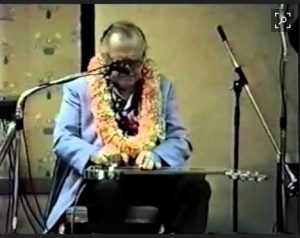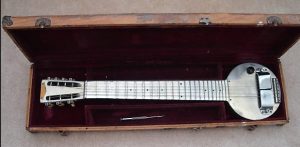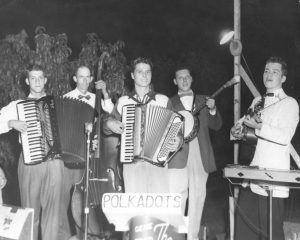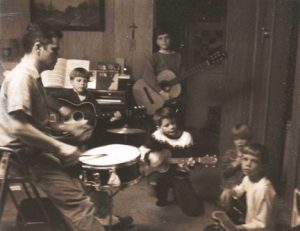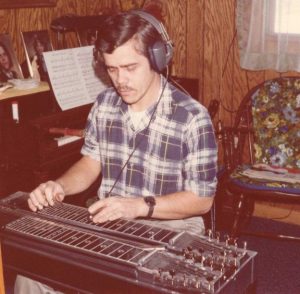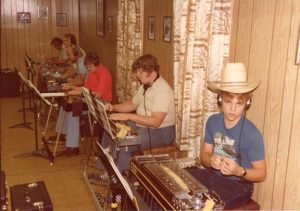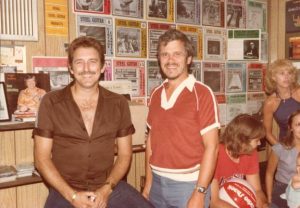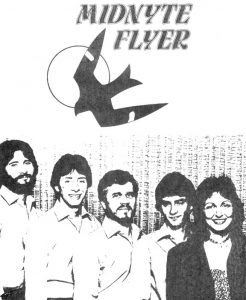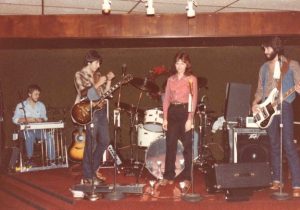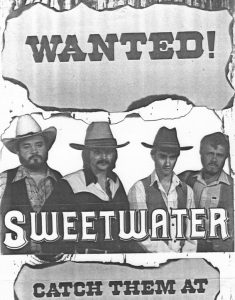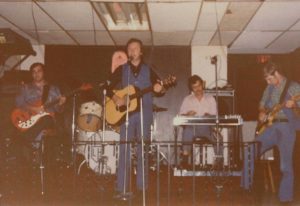The Harvest Gold Band (HGB) was the premiere country band in the North Coast area during the 70s and 80s. In 1981 their steel guitar player decided to take a job with a band in Nashville, so they needed to find a replacement.
One night Buddy James and some other HGB members came to a bar where I was playing. After listening for an hour or so they said that they liked what they heard and asked if I would be interested in joining their band. I indicated that I would after I had finished my commitment with the current band, which would take two weeks. Two months went by and I didn’t hear from the Harvest Gold people. I had all but given up on them when one night Buddy and Patti showed up at a bar where I was playing, apologized for not contacting me, and offered me the job with HGB.
I had no idea why it took so long for them to call me back. I found out later that when they heard I was a school teacher they thought I would be way too “straight” to fit into the Harvest Gold culture. I realize now that in order to have a successful band, besides having good musicians you need compatible personalities. Harvest Gold was obviously aware of this since the band lasted over 20 years. Being in a band is somewhat like being in a marriage except more people are involved, making it even more complicated.
So I started my new career as a member of HGB. Buddy gave me some cassette tapes of their music and I went to work. We got together every Tuesday night in Buddy’s basement to rehearse for the following weekend show. I had been accustomed to playing in “pick-up” bands and it really felt good to be in a band that actually practiced together!
My first gig with the band was a four night stint at Bronco’s Night Club on route 14 south of Ravenna – Thursday thru Sunday night. We did this once every month. This was a fun place to play, the customers were friendly, the food was good, and I had a ball!
The Harvest Gold musicians were fun to be with. We had a good time on and off the stage, the audience could sense that we enjoyed each other, and it was reflected in our music. We genuinely liked each other (most of the time!). I can see why the band stayed together so long.
We had a bus that once belonged to the band “Judas Priest”. It was well equipped with furniture, sleeping facilities, generator, TV, air conditioning, etc. We each had our own bunk and since Buddy was the owner and band leader, he took the “executive suite” in the rear. Buddy did most of the driving, so while on the road the other members could practice, read, loaf, sleep, whatever. For fuel and maintenance the bus took part of our pay as an equal member of the band.
Since we were a weekend band and all the members had weekday jobs, this did not interfere with my teaching. We usually played one or two shows per week, maybe Saturday night and/or Sunday afternoon. On long weekends we would get on the bus Friday afternoon, head for our first gig, and were back home by Sunday night or early Monday morning. I do remember on one occasion standing in Buddy’s driveway on a Monday at 6AM just after getting off of the bus, when my alarm-watch went off telling me it was time to get up (I WAS up!). I was still able to make it to school on time.
Being on stage with a good band surrounded by fun people gave me a real high, but trying to look happy three or four nights in a row when I was tired could be difficult. I didn’t see any drug use in our group except for an occasional caffeine pill, but I can see why many show people become users.
The types of gigs we had were varied. We played the “animal clubs” (Eagles, Elks, Moose, etc.), night clubs, resorts, camp grounds, shows, theaters, dances, weddings, etc.
We even played for a Jim Traficant political rally in Youngstown, OH!
Some of our more interesting jobs were as “warm-up” band for the big country acts, quite often at the Ponderosa Park camp grounds in Salem, Ohio. We opened for almost every big name country band of the time, including Willie Nelson, Waylon Jennings, Charlie Daniels, Alabama, Oak Ridge boys, Reba McIntyre, to name a few.
It was quite revealing to see how each of these acts operated. For example, Waylon’s outfit came in with 3 huge semi-truck loads of stuff. His body guards were the Hells Angels, and they roared in on their Harleys in a big cloud of smoke, dust, and noise. In contrast, Charlie Pride came in quietly in a Chevy van pulling a trailer, and used our mics and amps. Boxcar Willie did something similar. Some, such as the Oak Ridge Boys, were very friendly and mingled with the crowd, while others would slink in surrounded by a barrier of body guards.
Some of the ex-stars were booked without a band and we would get the job of backing them. I remember one big-name singer in particular who previously had several number one hits but now was on his way down. He was booked at Stambaugh Auditorium in Youngstown and we were hired to back him. His agent sent cassette tapes of his music for us to learn. I reverse-engineered every one of those songs down to the last note and we rehearsed until we could play every song in our sleep. When we did a warm-up with the singer before the show, he tried to impress us with his importance by loudly swearing that we were doing his songs all wrong. He was especially hard on our young drummer. Buddy finally told him that if he didn’t lighten up he would be doing the show without a band. He eventually settled down, we put on a very successful show together and everyone left as friends.
We opened for one well-known singer five times. The first time he was a relative unknown on his way up, and was the most gracious person on the planet. But as his fame increased he kept getting more and more obnoxious. The last time we worked together he was now a world-wide star and was absolutely unbearable! Even his band members couldn’t stand him and would come over to hang out in our bus during their breaks.
It is easy to criticize him for acting this way, but one has to remember that when a person becomes that famous, everyone wants a piece of him. This guy could not even buy a burger at McDonalds without getting stared at or pestered. Some people are unable to handle this.
Another interesting thing I observed was the way that some of these guys treated their band members. Most of the side-men made “peanuts” compared to the head man. If one complained or asked for a raise he would be replaced by a musician every bit as good who would take minimum union wage just to be seen on stage with the big star. I finally realized that there is a musician in almost every small town just as good or better than any one in Nashville. The woods is full of talented musicians. Only a very few make it big financially – most of the others struggle.
If you want to be a professional musician, my advice is to have a strong back-up plan. Music is a fantastic hobby, but you had better have another skill to rely on in case the myth explodes.
One star who treated his band members exceptionally well was Conway Twitty. He bought each one a house close to his and they all lived together as a small community.
The Harvest Gold Band played its last gig on New Years Eve, 1991-92. It was becoming difficult to book a 6-piece band in the financial climate of the time. Resorts and clubs were beginning to book “one-piece bands” consisting of a singer-guitar player with a computer, drum machine, looper pedal, and harmonizer. With this equipment, one person can sound like a whole group at a fraction of the cost.
On YouTube I have put together a video and slide show of the Harvest Gold Band. It is accompanied by our music recorded live at Bronco’s in 1984, and is about 16 minutes long. Here is the link:
Enjoy!
Gene
